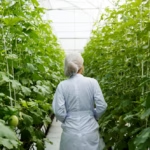Contract farming in agroprocessing has the potential to be a beneficial arrangement for both farmers and agroprocessors. Contract farming is a system where farmers enter into agreements with agroprocessing companies to produce a specific crop or commodity according to predetermined quality and quantity requirements.
Here are some key points highlighting the potential of contract farming in agroprocessing:
- Market Stability: Contract farming provides stability to both farmers and agroprocessors by ensuring a consistent supply of raw materials. Agroprocessors can plan their production and processing activities more efficiently, knowing that they have a guaranteed supply of crops from contracted farmers. This stability also helps in reducing market volatility and price fluctuations.
- Quality Control: Agroprocessors often have strict quality standards and specific requirements for the raw materials they use. Through contract farming, they can work closely with farmers to provide them with technical support, training, and guidelines to produce crops that meet the desired quality standards. This helps in maintaining consistent quality throughout the supply chain.
- Access to Finance and Inputs: Contract farming arrangements often involve the provision of necessary inputs, such as seeds, fertilizers, and technology, to farmers by agroprocessors. This ensures that farmers have access to quality inputs, which can improve their productivity and reduce risks. Additionally, some contract farming agreements may include financial support, such as pre-harvest advances or credit facilities, enabling farmers to invest in their operations.
- Risk Sharing: Contract farming can help in mitigating various risks faced by farmers. Agroprocessors may provide price guarantees to farmers, protecting them from price fluctuations in the market. Additionally, they may also share the risk of crop failure due to adverse weather conditions or pests and diseases. By sharing risks, contract farming can provide a level of security to farmers and encourage them to adopt modern farming practices.
- Technology Transfer and Knowledge Sharing: Agroprocessors often possess technical expertise, research and development capabilities, and market insights. Through contract farming, this knowledge and technology can be transferred to farmers, enabling them to improve their farming techniques, adopt new technologies, and enhance their overall agricultural practices. This knowledge transfer can lead to increased productivity, efficiency, and profitability for farmers.
- Market Access: Contract farming can provide farmers with a direct market link to agroprocessors. By eliminating intermediaries, farmers can receive fair and transparent prices for their produce. Additionally, contract farming can enable farmers to access new markets, both domestically and internationally, that may have been previously inaccessible to them. This can lead to increased income and opportunities for farmers.
- Sustainable Agriculture Practices: Agroprocessors often have sustainability goals and requirements related to environmental conservation and responsible agricultural practices. Through contract farming, they can encourage farmers to adopt sustainable farming methods, such as organic farming, water management techniques, or reduced chemical usage. This promotes environmentally friendly practices and enhances the overall sustainability of the agricultural sector.
However, it is important to note that the success of contract farming in agroprocessing depends on various factors, including clear and fair contractual agreements, effective monitoring mechanisms, adequate infrastructure, access to extension services, and a supportive policy and regulatory environment. These factors play a crucial role in ensuring that the interests of both farmers and agroprocessors are protected and that the benefits of contract farming are realized.









